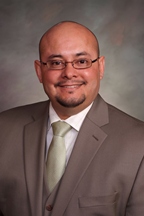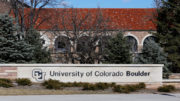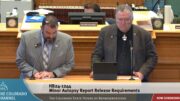By Jeffrey A. Roberts
CFOIC Executive Director
At least three bills affecting the flow or availability of information in Colorado are expected to be introduced after the 2014 session of the General Assembly convenes Wednesday.
We already told you about a proposal to strengthen the reporter’s shield law, motivated by the ordeal of a Fox News reporter who could have been jailed for not revealing sources for a story on the Aurora movie theater shooting. Another bill in the pipeline would require the eventual destruction of images captured by passive surveillance cameras and a third would specify how much governments can charge to fill requests for public records.
Making research and retrieval fees consistent statewide
The fee legislation, planned for introduction later this month by Democratic Rep. Joe Salazar of Thornton, is intended to add clarity and statewide uniformity to a process that often can be frustrating both for those who request public information in Colorado and the custodians, or keepers, of that information. The idea is to encourage people to make their requests as specific as possible, minimizing the workload for governments. In turn, the cost of obtaining public information, which can be prohibitively expensive in some circumstances, could be significantly lower, depending on how much a governmental entity currently charges.

Rep. Joe Salazar
“I think it’s a good compromise,” Salazar said. “It should make it easier for the public to access its own documents.”
The Colorado Open Records Act (CORA) now says nothing about how much local governments and the state can charge to research and compile public records that are not criminal-justice records. It addresses only the cost of data manipulation and computerized records, and it specifies that you can’t be charged more than 25 cents per page for standard copies of public documents or more than the actual cost of copying a photo or some other record kept “in a format other than a standard page.”
With state statutes silent on fees, governments in Colorado set their own rates with some guidance from the courts. A 2003 Colorado Court of Appeals decision established that public entities can charge only “nominal” fees to research and retrieve large amounts of records, with “nominal” defined as “trifling, especially as compared to what would be expected.” Last August, the Court of Appeals ruled that Colorado governments can charge “reasonable” research-and-retrieval fees, upholding a $25-per-hour tab (which totaled $14,305) for emails that some Arapahoe County property owners wanted from a special district. The appellate court also approved the district’s requirement that a deposit be paid, as well as a $25-per-hour fee for the district’s lawyers to identify and separate privileged documents that had to be redacted or withheld.
But even with some direction from the judicial branch, “there is a lack of consistency across the state,” said Salazar, an attorney who makes about a dozen open-records requests each year on behalf of clients. “Some municipalities charge an arm and a leg to retrieve documents. Some entities … don’t charge anything.” For some governmental entities, he contended, charging high prices for public records is a “money-making scheme … a way to chill the public’s right to request documents.”
The governor’s office and several state agencies require $20 per hour to process records requests that take more than two hours of staff time, but fees vary among other state government entities. The legislature, for example, charges “not more than” $30 per hour if more than one hour of research is needed. The department of human services charges actual staff hourly rates and benefit costs to compile records after two hours’ time.
A 2013 report by Colorado Ethics Watch found that local governments are “all over the map” regarding fees for public records. Hourly research prices can reach $50 in Aurora while Denver charges $35 per hour after the first 30 minutes. Lakewood also starts charging after the first half hour, but its fee is based on the “hourly rate, including benefits, of the least technically trained person capable of performing the search/retrieval.”
Salazar’s proposal would establish a two-tiered payment system for governmental entities statewide. Requests that are specific and small enough would be filled at no charge. The fee for larger requests would be based on a multiple of the minimum wage ($8 per hour in Colorado), determined by the level of employee needed to process the request.
For large or less specific requests, the proposal “also requires the parties to sit down and talk with each other to narrow the request,” Salazar said.
Representatives of both requesters of information and governmental entities tried and failed during several meetings last year to reach a consensus on new CORA language that would specify search-and-retrieval costs.
Expiration date for surveillance photos and video
The passive surveillance bill, to be introduced by Rep. Polly Lawrence, follows HB-13 1112, which died in committee last year. That proposal would have created a CORA exemption for video and still images taken by monitoring devices such as photo radar recorders and HALO street cameras operated by police.
This session, the Douglas County Republican hopes to require that video and still images obtained by government-run passive surveillance cameras be destroyed within six months after a recording is made. The bill would exempt jail and correctional facility recordings, and a law enforcement agency could obtain a court order to retain video and still images for longer periods if needed for a criminal investigation.
“There’s a lot of us that don’t like surveillance cameras everywhere – and they are everywhere now – and we feel that putting some limit on the time that government agencies can retain these records would be the most reasonable way to approach this,” Lawrence said. “I don’t want to sound like a conspiracy theorist, but it’s time we put some guardrails on what governments can and cannot do. I think my constituents would like to see the cameras disappear completely, but that’s not going to happen.”
She acknowledged that law enforcement agencies have legitimate public-safety uses for photo and video surveillance. For example, police used surveillance camera images to identify the Boston Marathon bombers.
Follow the Colorado Freedom of Information Coalition on Twitter @CoFOIC. Like CFOIC’s Facebook page. Do you appreciate the information and resources provided by CFOIC? Please consider making a tax-deductible donation.




